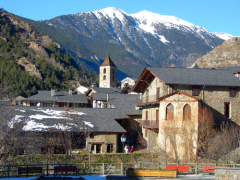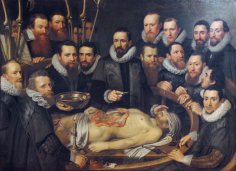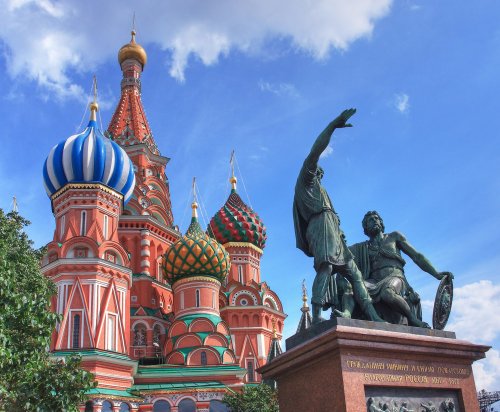
In the autumn of 1933, the people of the tiny mountain principality of Andorra demanded universal suffrage and preferential use of their country's natural resources, which at the time were effectively controlled by French and Spanish companies. Spain agreed to these demands, and France threatened Andorra with war. The press dubbed these events the “Andorran Revolution.”
The country desperately needed a strong leader. And one emerged, declaring himself Count of Orange, Baron Skosyreff, Supreme and Sovereign Prince of Andorra, and Defender of the Faith, promulgating the first Constitution of Andorra and declaring war on the Bishop of Urgell.
Who is he who so easily won the hearts of Andorrans?
On the way to the throne
Pomposity aside, let's turn to the biography of Boris Mikhailovich Skossyreff, who was born on January 12, 1896, in Vilnius, to a Russian noble family, and served in the Tsarist army. The events of 1917 forced him to emigrate to Great Britain and seek political asylum, which is not surprising, since according to some reports, Skossyreff had been recruited by British intelligence during the First World War.
Officially serving in the Royal Navy and then the Foreign Office, he carried out a number of secret missions for the British government in Japan and the United States. Charismatic, compassionate, and exceptionally talented at learning languages—that's how he remains in the memories of those who knew him.
In 1925, using a “Nansen passport” for a stateless person, Boris traveled to the Netherlands, where he served at the royal court for several years. For his exceptional services, Queen Wilhelmina granted him the title of Count of Orange, although official confirmation of this has yet to be found. In 1931, Skosyrev married a wealthy woman ten years his senior, which may have been the main reason for his abrupt departure with his mistress, a young, beautiful Englishwoman.
In 1933, the future monarch visited Andorra for the first time and settled in Santa Solomà, in a house that still stands and is called the “Russian House” in his honor. Here, in full contact with Andorran reality, he worked on a plan to transform Andorra into a zone with a favorable fiscal regime (following the example of other small European states). During conversations with Andorran farmers, artisans, and politicians, it became clear that the youth who had revolted a few months before his arrival would support the reforms.
On May 17, 1934, Boris presented his plan to the General Council (Andorra's highest legislative and executive body), which not only rejected the plan, but also expelled its author from Andorra.
One more try
Skosyrev settles near the Spanish border with Andorra at the Mundial Hotel, where he behaves like a true monarch and launches a PR campaign that attracts keen interest from the press. He gives numerous interviews, including phone calls to The Times and The Daily Herald. In an interview with a Spanish newspaper, he admits he has no historical right to his claim, but as an honorable man, he understands the need to protect the rights of Spaniards living in Andorra and subjected to persecution by the neighboring republic.
Boris established contact with political groups in southern France, and eventually, in Perpignan, he succeeded in laying out his plan to a representative of the Duke of Guise, the pretender to the French throne. His main argument was that the head of France had never assumed royal sovereignty over Andorra, and that Boris could assume the role of regent for the French king.
French legitimists repeat this assertion in their newsletters. De Guise makes no statements, awaiting more facts, but this doesn't stop Skosyrev, who now speaks on behalf of the French crown. He publishes his proposal in the Principality's Official Bulletin and distributes leaflets in Andorra, explaining the essence of the proposed innovative reforms to Andorra's political system, the modernization of budgetary funds, the attraction of foreign investment, and the designation of the principality as a tax haven.
The distribution of ten thousand copies of the draft Constitution leads to one copy ending up in the hands of the Bishop of Urgell, who immediately declares in the press that his co-government with the President of France is the only possible one.
But on July 6, 1934, Boris Skosyrev addressed the General Council again, proposing his revolutionary plan to transform Andorra into one of the world's most important business centers, where banks, financial institutions, and international companies would flock to take advantage of the tax system. This time, 23 of the 24 Council members supported him.
The reign of Boris I
On July 8, 1934, as a reward for ensuring the happiness and well-being of the people of Andorra, Skosirev, with the support of the Andorran people, requested to be proclaimed Prince of Andorra. Again, 23 members of the Council supported him.
On July 9, 1934, the Provisional Government was founded, including Boris's friends: American millionaire Florenz Mazmon, advisor Pierre Torres Ribas, and… his English mistress. The General Council was declared a parliament, and a Constitution and decrees on freedom of speech, religion, political belief, and… absolute monarchy were adopted.
France effectively refuses to interfere with the General Council's actions, but the Bishop of Urgell does not. Boris I's monarchical reign ends quickly and quietly: on July 14, 1934 (according to some sources, July 21), Spanish Civil Guards, summoned by the Bishop of Urgell, arrest Skosirev. He is tried in Barcelona and exiled to Portugal.
Legends and hypotheses
The date of his arrest isn't the only discrepancy in published biographies of Boris Skosyrev. There are numerous hypotheses about his life after exile, and especially about the date of his death. According to one of the most recent, from 1956, after returning from a Siberian concentration camp, where he was sent in 1947 on charges of collaborating with the Nazi regime (some sources claim the sovereign prince served as an interpreter for the German army on the Eastern Front), Boris lived in the German town of Boppard, near Koblenz, where he died in 1989—or so his gravestone inscription states.
But for now, this is just speculation, another legend among many—for example, the title of Count of Orange and Skosyrev's connection to the Dutch royal family. This is considered unlikely, while the hypothesis of his collaboration with British intelligence services can be confirmed by the presence in the British Foreign Office archive of a dossier dated July 28, 1934, which is the only official document related to the coup d'état in Andorra and Boris I.
This document gave rise to a new hypothesis about the British secret services organizing a coup d'état with the aim of destabilizing the situation between France and Spain, using their agent Boris Skosyrev for this purpose.
Was Boris Skosyrev simply one of thousands of Russian exiles, without family or means of support, dreaming of privilege and social attention, fighting for it with his only weapons: a penchant for adventure, a talent for languages, and charisma? Was he a British agent?
Perhaps one day we will get an answer to this question, but we must not forget that it was he who promulgated the historically first Constitution of Andorra, quite liberal for its time, which marked the beginning of the reformation of the political and economic system of Andorra and the birth of another small tax haven.





